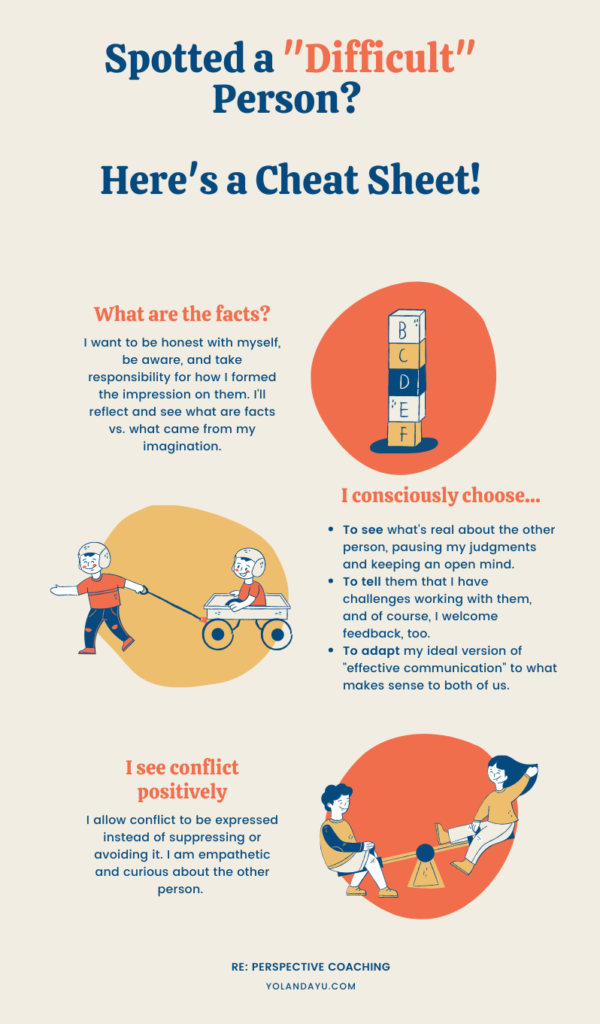Do you feel like fleeing the moment you see someone’s name? Or do you often feel angry or frustrated when dealing with someone?
There is a great variety of difficult people in life: fast-tempered, uncooperative, criticizing, stubborn, you name it. And the fast-paced environment of the technology industry seems to breed more of these stress-inducing creatures.
Yet we crave more connection with them. Recently, the topic of “how to communicate better with difficult people” repeatedly landed on my table, so I’d take this chance to share a few exercises that might help.
💡 Reflection 1: How much of that “difficultness” belongs to them, how much to me?
“Someone is difficult” is a perception, even if it might be a well-founded one. And it’s key to check on our perceptions because we risk forming perceptions too quickly, sometimes with minimum data points such as visual clues or associations. For example, we tend to perceive people in high power as “difficult” even if we hardly interact with them.
To take ownership of our perceptions needs a good level of honesty and self-awareness. After all, it feels much easier to blame someone for being difficult instead of admitting that “I have difficulty communicating with someone.”
Which one of the following do you want to own up?
🌒 Part of the “difficulty” comes from my imagination
If you suspect that this is the case, watch out for the common culprits. Did you “feel” that the person will be difficult just by observing their presence? Or did you form the impression just because others say so? Did they remind you of a tough person you had dealt with in the past?
🌓 Part of the “difficulty” comes from my experience
The perception might have come from a challenging experience. Difficult experience =/= difficult people. Therefore, it’s worth examining whether the challenge was due to situational factors.
a. What’s in their world
Were they rushing for a deadline and had no resource to entertain your request? Or were they in a rough patch and couldn’t hold back their criticism?
b. The difference of role, interest, and perspective
Did they hold different interests and views because of their role?
c. The difference in styles
Are you someone who prefers clarity and precision while the other person is into big-picture, and it just seems impossible to get to effective communication? Or does the person score low on “agreeableness” and tends to hold strong views about things?
d. The imperfections
A person may be “fast-tempered” when they feel insecure or have a problem regulating emotions; A person may act patronizing when they are well-meaning and want to help but overlook boundaries. We all have our imperfections. The inability to deal with other people’s imperfections also counts as one.

💡 Reflection 2: Does viewing someone as “difficult” help me?
Suppose someone is indeed “difficult,” the situation calls for more proactive-ness, not less. However, holding such a perception usually makes us more defensive and withdrawn. That is fascinating. What we can consciously choose include:
🌒 Choose to SEE
We all operate in our own contexts (values, circumstances, needs, personalities, flaws) that are little known or understood by others without proactive communication. It is doubtful that we can ever have sufficient information to make a fair assumption about another person.
We simply are operating in different spheres. JWT (James Webb Telescope) is looking back 13.7 billion years. Meanwhile, quantum physics scientists are experimenting to know how fast a particle travels in nanoseconds. Can you imagine a conversation between a JWT astronomer and a quantum scientist?
Choosing to see what is real about the other person means pausing our judgment and keeping an open mind to see, inquire, and understand.
🌓 Choose to TELL
Let them know that you seem to have some challenges working with them. Such feedback is vital but is often missing. When we think someone is “difficult,” we tend to avoid the person altogether. Such behavior has to do with our tendency to avoid conflict.
A possibility is, when you think the other person is being “difficult,” they might also be thinking of you as being “difficult.” Open feedback without pointing fingers opens a dialogue that is much needed.
🌔 Choose to ADAPT
Sometimes our frustration and stress result from an ideal version of effective communication. If we ask 100 people, we probably will get 100 “ideal versions.” What is effective in communication can be highly situational and context-dependent. For example, communicating with a purpose to inform, to listen, to bond, or to influence will need vastly different measurements.
To simplify things a bit, can we adapt to the person and design a “new ideal” just with this particular person?

💡 Reflection 3. What is my capacity for holding tension?
The reason why we want to flee from a difficult situation is that we dislike conflict. However, conflict does not go away when we choose not to express it. We still feel and pre-empt this unexpressed conflict in the form of tension.
Like many other challenges, the best way to address them is to face them, have a conversation, and do something. Although we usually think of conflict as unfavorable, it could serve us much more when allowed constructively.
Conflict is nothing negative. The avoidance of it is.
But like any strong medicine, conflict can be difficult to stomach. What is your capacity for holding it? When we can create an objective mental space, we benefit more from the truths it unveils.
The secret to creating this space is to remove some of the “self.” We often don’t realize that the “self” takes up a vast area. “What is the other person thinking of me?” “Why do they deny me?” “What’s the chance of me getting what I want?”
As we politely ask some of the “self” to evacuate, vast space gets created, curiosity and empathy move in. That’s also a space where we see conflict not scary but a conversation about what is. And when that unfolds, we know that we didn’t need that much courage to face anyone.
👉Book a call with me for a discussion if you have specific questions in this area.

Follow me on LinkedIn here. More career-related videos are available on my YouTube channel.


